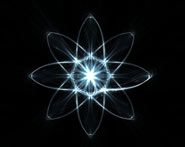


 الفيزياء الكلاسيكية
الفيزياء الكلاسيكية
 الكهربائية والمغناطيسية
الكهربائية والمغناطيسية
 علم البصريات
علم البصريات
 الفيزياء الحديثة
الفيزياء الحديثة
 النظرية النسبية
النظرية النسبية
 الفيزياء النووية
الفيزياء النووية
 فيزياء الحالة الصلبة
فيزياء الحالة الصلبة
 الليزر
الليزر
 علم الفلك
علم الفلك
 المجموعة الشمسية
المجموعة الشمسية
 الطاقة البديلة
الطاقة البديلة
 الفيزياء والعلوم الأخرى
الفيزياء والعلوم الأخرى
 مواضيع عامة في الفيزياء
مواضيع عامة في الفيزياء|
Read More
Date: 17-4-2017
Date: 5-4-2017
Date: 17-4-2017
|
Infinite Multiplication Factor, k∞
Not all of the neutrons produced by fission will have the opportunity to cause new fissions because some neutrons will be absorbed by non-fissionable material. Some will be absorbed parasitically in fissionable material and will not cause fission, and others will leak out of the reactor. For the maintenance of a self-sustaining chain reaction, however, it is not necessary that every neutron produced in fission initiate another fission. The minimum condition is for each nucleus undergoing fission to produce, on the average, at least one neutron that causes fission of another nucleus. This condition is conveniently expressed in terms of a multiplication factor.
The number of neutrons absorbed or leaking out of the reactor will determine the value of this multiplication factor, and will also determine whether a new generation of neutrons is larger, smaller, or the same size as the preceding generation. Any reactor of a finite size will have neutrons leak out of it. Generally, the larger the reactor, the lower the fraction of neutron leakage. For simplicity, we will first consider a reactor that is infinitely large, and therefore has no neutron leakage. A measure of the increase or decrease in neutron flux in an infinite reactor is the infinite multiplication factor, k∞. The infinite multiplication factor is the ratio of the neutrons produced by fission in one generation to the number of neutrons lost through absorption in the preceding generation. This can be expressed mathematically as shown below.




|
|
|
|
علامات بسيطة في جسدك قد تنذر بمرض "قاتل"
|
|
|
|
|
|
|
أول صور ثلاثية الأبعاد للغدة الزعترية البشرية
|
|
|
|
|
|
|
في مستشفى الكفيل.. نجاح عملية رفع الانزلاقات الغضروفية لمريض أربعيني
|
|
|